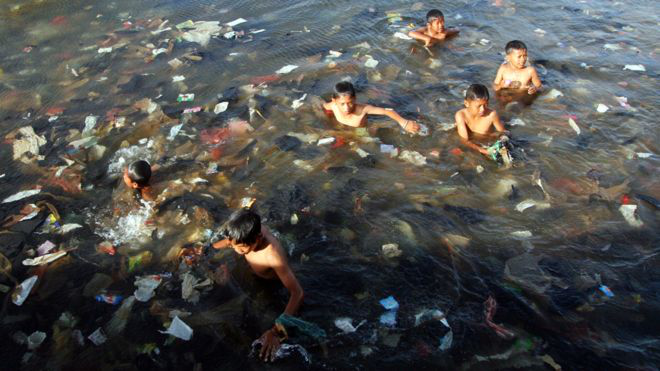
Nations responsible for much of the world's ocean plastic pollution have promised to start cleaning up their act. At a UN oceans summit, delegates from Thailand, Indonesia and the Philippines said they would work to keep plastics out of the seas.
Some of environmentalists say the measures proposed are not urgent enough. But UN officials praised the statement. Meeting in New York, they said it was part of a clear international action against ocean pollution. Eric Solheim, the UN's environment director, told BBC News, "There are quite encouraging signs, with nations taking the ocean much more seriously. Of course, there is a very long way to go because the problems are huge."
It is estimated that 5-13 million tons of plastics flow into the world's oceans annually. Much of it is eaten by birds and fish – and fragments of plastic have even been found in organisms at the bottom of the ocean.
A recent paper said much of the marine plastic often originates far from the sea – especially in countries which have developed consumer economies faster than their ability to manage waste. Reducing the plastic loads in these rivers by 50% would reduce global plastic inputs by 37%, it said. A report to the UN conference from the Thailand government says most marine plastic debris is land-based, caused by inefficient waste management and poor handling of plastic wastes. In Thailand, the total amount of garbage finding its way into the sea was estimated at 2.83 million tons in 2016—of which 12% was plastic.
The Thai government says the nation has established a 20-year strategy to deal with the problem, including sparing money for keeping plastic out of the sea and encouraging eco-packaging design and eco-friendly substitutes for plastics. In Indonesia, the government is starting a mass education programme for school children, and in Philippines new laws are being developed, and part of the challenge is finding substitutes for plastics. An international prize for smarter materials and design for packaging was launched recently by the Ellen MacArthur Foundation.
本时文内容由奇速英语国际教育研究院原创编写,未经书面授权,禁止复制和任何商业用途,版权所有,侵权必究!(投稿及合作联系:028-84400718 QQ:757722345)
1.Why did Eric Solheim think the signs were encouraging?
A Because the measures proposed are not urgent enough.
B Because delegates from Thailand never polluted the sea.
C Because people took the ocean plastic pollution seriously.
D Because there was a long way to go.
解析:选C。细节理解题。根据第二段中的There are quite encouraging signs, with nations taking the ocean much more seriously.可以得知他认为很多人开始重视这个事情,这就让人很振奋了。故选C。
2.Where did the most of the ocean plastic go at last?
A The garbage near the sea.
B The river to the seas.
C The sea creatures’ stomach.
D The developed countries.
解析:选C。细节理解题。根据第三段第二句的Much of it is eaten by birds and fish– and fragments of plastic have even been found in organisms at the bottom of the ocean可以得知很多海洋塑料垃圾被海洋生物给吃掉了。故选C。
3.The ocean plastic pollution increased faster due to ______.
A inefficient waste management
B good handling of plastic wastes
C the wrong way into the sea
D the slower economy in the country
解析:选A。细节理解题。根据第四段中的most marine plastic debris is land-based, caused by inefficient waste management and poor handling of plastic wastes可以得知是没能有效处理塑料垃圾才导致垃圾这么多的。故选A。
4.What measure did Philippines take to stop the sea pollution?
A Sparing a lot of money.
B New places for holding the rubbish.
C Starting a mass education.
D Creating new materials for plastics.
解析:选D。推理判断题。根据最后一段第二句的in Philippines new laws are being developed, and part of the challenge is finding substitutes for plastics可以得知菲律宾在研制塑料的替代品。故选D。